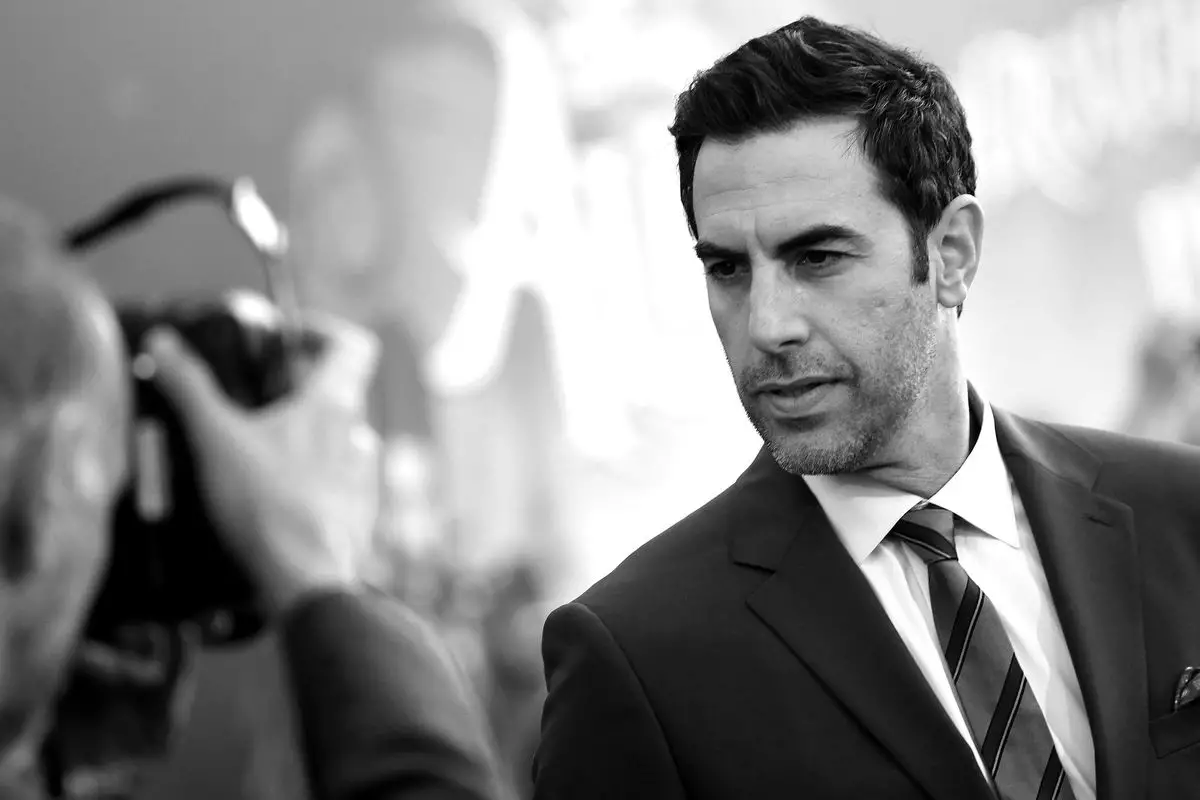In his new Showtime series, Sacha Baron Cohen wanted to know, “Who Is America?” and promptly set off to find out. The faux-inquisitive title can be answered quite plainly once you’ve finished the first episode: a bunch of easily duped half-wits, apparently. The most succinct way to describe the series is that it follows Baron Cohen, transformed into a different character for each segment, as he interviews, exposes and humiliates Americans.
Using sophisticated prosthetics and an impressive array of accent-work, Baron Cohen disguises himself as a myriad of personalities, most of whom are caricature-like offspring of the current cultural climate in the United States. There’s a gender studies professor who apologizes profusely for being a white, cisgender male; there’s a far-right wing lunatic who runs a conspiracy theory site; there’s a former Mossad agent whose thick Israeli accent and hyper-militarization commands respect and reverence from American conservatives.
The show “Who is America?” Is quite enlightening.
I’m not any closer to finding out WHO is America, but I do know this much: conservatives are all HUGE MORONS.
— TheGodPod (@thegoodgodabove) August 6, 2018
But the characters serve as mere catalysts for the real entertainment: a rotation of unsuspecting guests who believe they’re being interviewed by a professional, when in fact they are being tricked by the man most famous for “Ali G” and “Borat.” In this regard, “Who Is America?” is relentless. Baron Cohen is able to coax astounding behavior from his guests, often with very little effort on his part. Sometimes, when his guests make themselves look horribly stupid without his help, Baron Cohen throws a brief, giddy smile at his crew members.
No demographic is left unprotected. Indeed, from across all spectrums — the unknown and the well-known, the well-off and the poor, the paranoid and the pretentious, the intelligent and the idiotic — “Who Is America?” reveals people to be utter dunces. The series is of utmost significance to these times, not just due to the political and cultural range of the interviewees, but because it exposes how easily manipulated Americans can be so long as they believe the person they’re speaking to is on their side.
The show is almost difficult to watch because it’s just too easy: easy to lure people to give into their worst instincts, easy to reveal how far people will go to push their own agendas, easy to trick people into filming a bogus segment where they show their asses (literally, in the case of since-resigned-and-disgraced Congressman Jason Spencer — you’ll have to watch to understand).
“Who Is America?” is tragedy disguised as comedy, and part of Baron Cohen’s intent is to demonstrate how little prodding it takes for people to humiliate themselves in the name of maintaining a reputation or pushing a doctrine. Viewers have to laugh at the unbelievability of it all, but this stops just as soon as they realize that it doesn’t have to be believable for it to be real. That’s where the show teeters into horror-comedy territory.
Each character has something different to reveal about the American population, and so it is appropriate that Baron Cohen’s conceptualization is mostly, but not totally, political. He makes a fool out of an art gallerist whose performative intellectualism and pretentiousness reach a boiling point without much interference; he convinces a B-list reality TV star to cash in on philanthropy-as-fashion, and she hardly bats an eye as she reads from a script promoting the training of child soldiers.
The setups are so ludicrous that you couldn’t possibly imagine the interviewees going along with them, and some of them don’t (journalist Ted Koppel, for example), but many of them are people so driven by greed and starved for power that they’ll say and do anything for both.
In the fourth episode, a yacht broker promises to make a boat that can shoot electricity at Syrian refugees lost in the Mediterranean, and a Republican delegate takes part in a terrorist attack simulation where he is told to dress up as one of the “Muslims” he claims to be so afraid of. For some reason, his costume involves an Aladdin-style genie bottle, a wooden flute and a snake in a pot.
None of this is a red flag for him, and how would he know any better? He doesn’t know anything about the people he fears and has no curiosity or drive to learn more about them, and this is precisely why he fears them so much. It’s one of the many ways that the show exposes the ignorance of flagrant Islamophobes and racists.
The glorious thing about Baron Cohen’s various accents is that he uses them to make his subjects agree with horrifying or ghastly statements, knowing that the apparent language barrier will incentivize them to rationalize whatever he says. This is how Sheriff Joe Arpaio said that he would probably accept a “blow job” from Donald Trump or how a Republican delegate agreed to spread “H.I.V.,” which Baron Cohen’s Mossad character claimed was an acronym for an Israeli terrorist-prevention tactic: “hide, infiltrate, violence.”
The Mossad agent character, named Erran Morad, is the most effective of the series. Baron Cohen surely knows this because Morad is featured most frequently of all the characters, typically appearing twice per episode. Sure, Morad is just a character on a satirical show, but Baron Cohen uses him to show a deep understanding of the historical relationship between Israel and the American right.
The Morad character taps into the North American infatuation with the idealized Israeli: an ultra-militarized, hyper-masculine no-nonsense hard ass who’s dismissive of liberal namby pamby. When Morad suggested arming children as young as 3 years old like they do “in Israel,” gun-crazed politicians threw their hands up and nodded their heads in agreement, as though kids with guns was something they’d wanted in America for years.
The overarching theme of these segments is that people will do nearly anything when in a state of admiration or flattery. There is scarce a critical thinker to be found, especially in the Morad segments. There is, however, an alarming willingness to go along with anyone who caters to every whim, validates every concern or belief or strokes the vanity of an ego-driven soul. Baron Cohen leads each conversation to exactly where he needs it to go, but the interviewees do the rest of the heavy lifting.
Segments that go in the opposite direction — ones meant to stoke outrage instead of mindless adoration — are those with Dr. Nira Cain-N’Degeocello, the NPR-obsessed professor. His best bit occurred in the second episode, when he informed a group of racist Arizonans that the world’s largest Mosque (outside of the Middle East, of course) would be built in their small town.
Needless to say, the blood pressure built immediately and furiously. The scene is hysterical for the level-headed viewers because it’s fun to watch bigots get heated over something so ridiculous and improbable. This character doesn’t do the crazy “gotcha” segments that Erran Morad is so effective in, but it is certainly fun to watch him make people uncomfortable.
https://twitter.com/Devin_Vainer/status/1026293411995967488
“Who Is America” is a barometer of the current era. It is troubling to see that the scale favors a culture darkened by dogmatism, ignorance and, frankly, sociopathy. Precisely how can anyone gage who America is? Baron Cohen figured out a way, and though he played dirty to get there, his dishonesty might be the only way to reveal some form of truth.

















